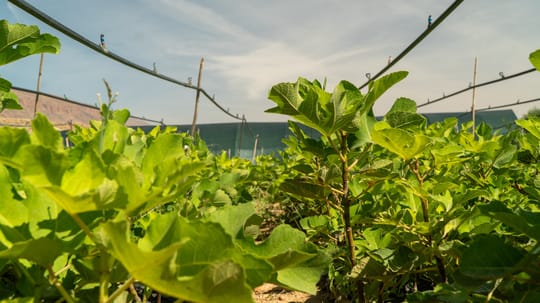Escaping from the heat of Marrakech, HAF intern for technological and social media initiatives, Miranda LaBrash, and intern for multicultural initiatives, Hannah Rickard, took a mid-week excursion to the oasis of Essaouira. Dubbed the “Windy City”, Essaouira is an ancient port city located in the southwestern quadrant of Morocco, and is around three hours by bus from Marrakech.
Formerly known as Mogador, Essaouira was established by Sultan Sīdī Muḥammad ibn ʿAbd Allāhin in 1765. [1] UNESCO declared the Medina of Essaouira a world heritage site due to the mélange of European, Arab, Muslim, and North African architectural influences and styles. [2] As the UNESCO site states, Essaouira “is…an example of a multicultural centre as proven by the coexistence, since its foundation, of diverse ethnic groups, such as the Amazighs, Arabs, Africans, and Europeans as well as multiconfessional (Muslim, Christian, and Jewish).” [3]
Former HAF employee, and current employee for the Bayti Association of Essaouira [4], Rakia Hanin, reiterated this statement, as she noted that the Sultan wished to build a city that would be “open to the world”, and that would express Morocco’s genuine and steadfast commitment to tolerance towards the world’s diverse communities.
In 2012, HAF collaborated with members of the Muslim, Jewish, and Christian communities in an education and restoration project in Essaouira. This initiative, enabled by the Ambassadors Fund for Cultural Preservation, focused on the process of recovering cemeteries from each of the respective communities and building upon and spreading knowledge and history gained from the recovery work. Four hundred and fifty young people participated in this initiative through presentations and cemetery visits. HAF also helped facilitate the development of a brochure detailing key socio-historical and religious characteristics of the cemeteries to share with future visitors. Additionally, this project resulted in the employment of three members of the Essaouira community as caretakers for the cemeteries. Finally, the project has shown to be a gateway to other community initiatives, including interfaith agricultural projects that started in the region and has now spread beyond.
Wednesday’s trip to Essaouira was a way for HAF to share its gratitude with those who have helped make these cultural diversity initiatives possible, and who continue to progress and fortify HAF’s and Morocco’s goals towards sustainable collaboration across all socio-cultural and religious groups in the Kingdom.
To signify this thanks, HAF donated walnut oil, recently produced through HAF’s own social enterprise, High Atlas Agriculture and Artisanal (HA3). Derived from locally grown walnuts in the Toubkal commune of the Taroudant province, the oil was processed by members of Moroccan communities who are employed at the premiere HA3 facility in Asni. Hannah and Miranda were honored to give two large quantities to the children of the Bayti Association, as well as a bottle each to Mr. Tarik Othmani, the president of the cultural Association of Essaouira Mogador, and HAF advisory board member and senior advisor to His Majesty Mohammed VI, H.E. Mr. André Azoulay, and three bottles to each respective guardian of the Jewish, Christian, and Muslim cemeteries.
A distinct Moroccan community, Essaouira serves as an example to the world for understanding and collaboration between members of all different religious, social, and cultural groups. HAF hopes to continue partnerships here, as well as develop further initiatives concerning education and preservation of Morocco’s diverse and rich past and present.
Follow HAF on Twitter @HafFdtn or like us on Facebook
Learn more at www.highatlasfoundation.org
For more information please contact: HAF@highatlasfoundation.org ; +212 (0) 5 24 42 08 21
Anthony Bald, Intern
[1] “Essaouira.” Encyclopaedia Britannica. Britannica Academic. Encyclopædia Britannica Inc., 2015. Web. 07 Aug. 2015.
[2] Advisory Body Evaluation. “Medina of Essaouira (formerly Mogador).” UNESCO World Heritage Center. United Nations, n.d. Web. 7 Aug. 2015.
[3] See note 2.
[4] The Bayti Association is a Casablanca-based, Moroccan non-governmental organization that works with children in difficult situations. Goals include education, family counseling, and reintegration into society.
